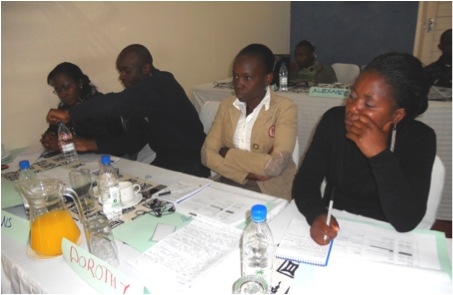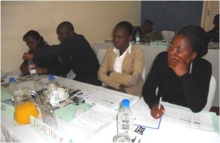
Many of the journalists were shocked to realize how dangerous smoking is. (Photo: Zarina Geloo)
In 2010, over five million people died. They lost on average nine years of life and several more years of good health and active living. This is how I started the workshop for a group of health journalists. I saw eyes glaze over, and I could almost read their thoughts: Here we go again, talking about AIDS.
“No,” I told them, “We’re talking about tobacco.” There was an instant shift in mood, and I knew I had their attention. Here in Zambia, we hear a lot about the horrific statistics of AIDS and Malaria, and yet tobacco is silently wreaking the most havoc, killing over 5.4 million people worldwide each year. What’s worse, 70-percent of those casualties are in developing countries.
Participants at a three-day workshop on the dangers of smoking were shocked into silence as medical doctors, academics and activists churned out statistics and evidence showing how tobacco use has become the largest cause of preventable deaths in the world. They also heard that cigarettes were more addictive than cocaine.

Many of the journalists were shocked to realize how dangerous smoking is. (Photo: Zarina Geloo)
Of the 20 participants drawn from community radio stations and print media, only one had ever written about tobacco and the dangers of smoking. The others said they had ‘heard’ that smoking was harmful to health but had certainly not seen it as a ‘serious’ health hazard. They likened it to alcohol consumption, an issue of choice.It was not surprising therefore that there was an initial skepticism about the harmful effects of tobacco; one journalist said the ‘shocking’ statistics on deaths related to tobacco were reminiscent of how advocates used HIV figures to scare people. Participants from community radio stations showed their defensiveness with arms crossed. Their audiences were people who lived off tobacco. They were hesitant to question an accepted way of life.
But this turned into real interest.
Dr. Fastone Goma, who is Dean of the school of medicine at the University of Zambia, broke it down to the fact that a single cigarette had over 4,000 chemicals with over 40 cancer causing agents; that the tar in cigarettes was the most damaging, causing many kinds of cancers; nicotine caused addiction which increased cholesterol levels and carbon monoxide reduced oxygen in the body.
He gave an example of a well-known opposition presidential leader, Michael Sata, recently evacuated to South Africa for suspected lung disease as a result of his chain smoking. His wife, a medical doctor, now has heart problems linked to passive smoking.
The ‘horror’ story was just too good for some journalists in the crowd, who began to stream the presentations through their radio stations, which then relayed them live to the public. The response was immediate. Listeners called in to express their concerns about youths smoking dagga and also about the falling price of tobacco. There were some who thought smoking was a choice people made, like they did about alcohol. Debate was lively and journalists were surprised at how interested people were in tobacco. This was distracting for the journalists and presenters so the streaming had to stop. But journalists from the broadcasting stations, who had only come to cover the opening of the workshop, came back for more.
The question that naturally followed was why, if it had such devastating health effects, was the tobacco industry not only allowed to operate, but flourish? Brenda Chitindi from the Tobacco Association turned the question back on the journalists: because people have not been sufficiently informed by the journalists, who were not sufficiently aware. “If you work with us, we can disable the tobacco industry,” she said. “You now have the information. It is your duty to educate the public on matters concerning their health.”